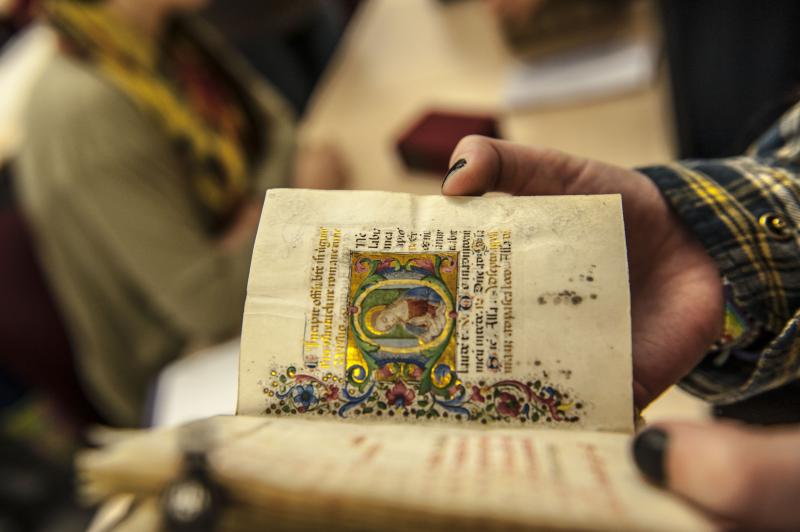

Employees and residents prevented subsequent looting attempts at the "underground shelter" where it was stored, Alyawi said. It was safely stashed away in the Baghdad suburbs, while the national museum was ransacked in the turmoil following the 2003 US-led invasion. In a country that bears the scars of decades of conflict and has seen antiquities and cultural heritage regularly plundered, the House of Manuscripts' collection has managed to survive. "There are writings in Arabic, Persian, Turkish, Hebrew and Kurdish," he added, noting the texts' "immense cultural diversity".

"Some manuscripts date back almost 1,000 years," said Ahmed al-Alyawi, who heads the House of Manuscripts body.
Waring gloves to preserve old manuscripts free#
6 and 7, the free two-day “Witches of the West" symposium, will explore lessons still relevant today about the uncanny connections between witch hunts, mass persecution, modern moral panics, and the flames of medieval and early modern pyres that devoured bodies and books (but not the legacy of ideas and dreams).In an annex of Iraq's national museum, a conservator pores over a 17th-century manuscript, carrying out delicate restoration work as part of efforts to preserve and digitise 47,000 precious texts. Speaking of medieval manuscripts, the 28th Annual Medieval Workshop, “Burnt at the Stake,” on Jan. "It’s our responsibility to preserve that interaction for future generations.”

“You hold the book in the same way that someone in the 12th century held it." “Unlike a painting, you get to interact with a manuscript in the same way as someone in the past,” she explains. “You always want to check with the archivist or whoever’s in charge of the collection.”Įspecially in this age of digitalization, Kemp yearns for the intimate sensation that comes with the bare-skin handling of old manuscripts. Kemp also offers the following cultural caveat: “When we say ‘no white gloves’, we’re primarily talking about books-not every type of cultural artifact,” she explains. “It’s just a question of minimizing that story, and preserving the manuscript as best we can.” A good example, says Kemp, is the Allepo Codex-Jerusalem’s 10th-century Hebrew Bible-the edges of which are blacked and crumbling after a thousand years of handling. “Whenever you touch a manuscript, your interaction always leaves an impression-and that becomes part of the story of that book,” she cautions. Kemp reminds everyone to thoroughly wash their hands before handling any archival object, and ensure your hands are free of oils, lotions and spikey jewelry.Īlso, never touch any paintings or gold leaf on the page, and only handle a manuscript by its edges. “I was originally taught that with parchment, you use bare hands, while with paper, you always use gloves.” (The distinction lies in the object itself-parchment is made out of animal skin, which is very durable, while paper is far more fragile and doesn’t hold up as well over the centuries.) “Now, however, it’s bare hands for everything.”īut don’t think you can go straight from snacking at Biblio Cafe to flipping through a 15th-century tome. One of her passions in both the Art History and Medieval Studies departments is introducing students to the ancient manuscripts and printed books in Special Collections-absolutely a hands-on proposition.ĭon’t feel antiquated if this is breaking news, however: Kemp says the dare-to-bare movement is somewhat recent. While her doctoral research focused on the cognitive function of images in 15 th century encyclopedic manuscripts, her broader research interests include knowledge visualization, image-text relations, cultures of reading and book history. Kemp, a sessional instructor in UVic's Department of Art History and Visual Studies, well knows of what she speaks. Honestly, gloves cause more problems than they actually solve.” You’re far more likely to damage the book by losing that haptic perception-you’re not going to be able to easily turn a page with gloves on, for example-and the cotton can actually wear on the object’s surface, as it’s fairly abrasive compared to your skin. “Our rule at UVic, and at most international libraries, is no white gloves,” she explains.
Waring gloves to preserve old manuscripts skin#
Despite the lingering meme of white-glove clad researchers delicately handling archival material, Kemp says bare skin is best when it comes to the centuries-old books in UVic Special Collections and University Archives. Jamie Kemp-the gloves are definitely off. When it comes to handling old manuscripts, there’s no fooling around for UVic researcher Dr.


 0 kommentar(er)
0 kommentar(er)
